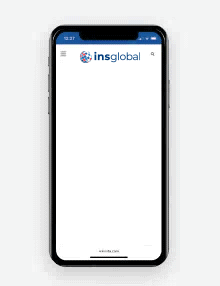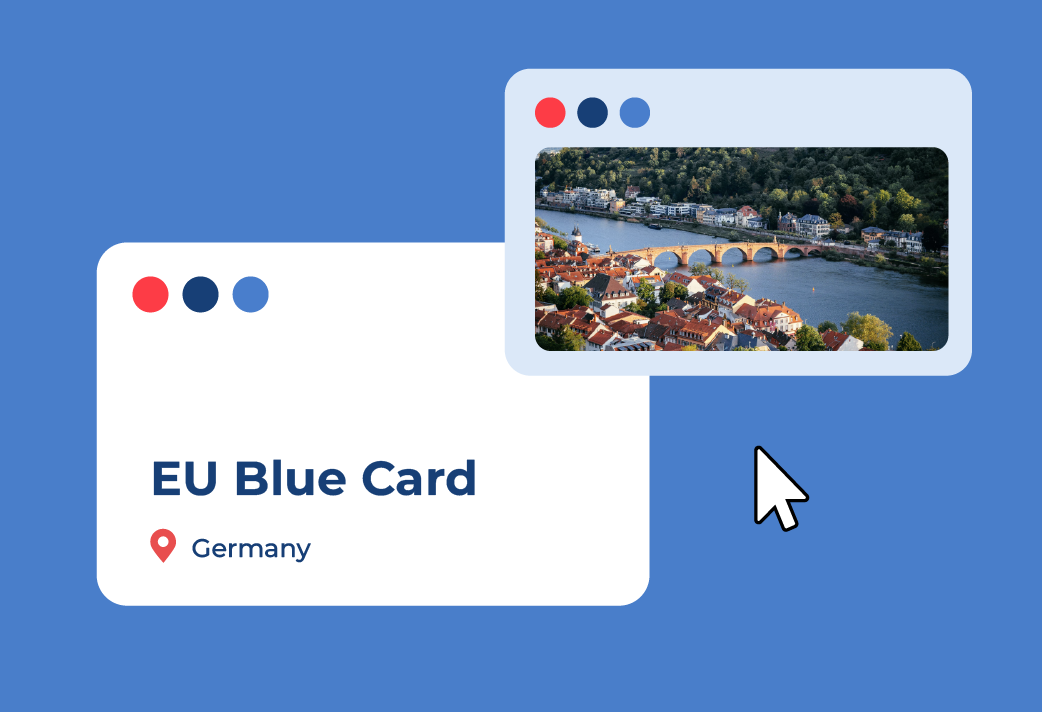Germany, known for its robust economy and high quality of life, continues to be a top destination for skilled professionals worldwide. The EU Blue Card is a critical pathway for the migration of highly qualified individuals to work in the European Union, with each participating country having its own rules and requirements. In 2024, new rules and updates to the EU Blue Card in Germany made it essential for potential applicants to stay up to date.

Tired of scrolling? Download a PDF version for easier offline reading and sharing with coworkers
What are EU Blue Cards for Workers in Germany?
The EU Blue Card is a specific residence permit designed to attract highly skilled non-EU/EEA citizens to work and live in the European Union.
Like the Green Card system in the US, the EU Blue Card aims to fill labor shortages in key sectors by simplifying and securing the immigration process for qualified professionals. In exchange, the permit allows holders to work, reside, and enjoy similar rights to EU citizens, including access to social services, family reunification, and mobility within the EU.
How Does Germany Apply EU Blue Card Rules?
Germany embraced the EU Blue Card (Blaue Karte in German) scheme with enthusiasm, having approved more than 27,000 cards since the system’s initial creation in 2009, recognizing the value of skilled professionals in sustaining its economic growth.
The German government has implemented specific regulations and criteria to streamline the Blue Card application process through official online channels and a network of global consulates and advisors.
In Germany, EU Blue Card regulations form part of the Residence Act, which is the piece of regulation that most directly deal with foreigners in Germany and is subject to regular review. Therefore, it’s important to stay up to date on any possible changes to avoid potentially large errors.
EU Blue Card Requirements in Germany
To qualify for an EU Blue Card in Germany, applicants must meet several criteria:
- Highly Qualified Employment – Applicants must have a job offer or an employment contract with a German company in a role that matches their qualifications. This requires the employer to have some form of legal entity, structure, or registration in Germany.
- Contract Length – As the EU Blue Card is meant to provide long term stability, any applicant’s contract in Germany must be signed for a minimum of 6 months/
- Minimum Salary Threshold – The applicant’s gross annual salary must meet the minimum threshold set by the German government, which is updated annually. As of 2024, the threshold is approximately €45,300 (around 1.5X the national average), with a lower threshold of €41,041.80 for shortage or bottleneck occupations like IT specialists, engineers, and medical professionals.
- Qualifications – Applicants need to hold a university degree or possess equivalent qualifications that are recognized in Germany. This qualification must have taken a minimum of 3 years to complete and may require the applicant to have their qualifications checking by a registered agency before application.
- Health Insurance – Proof of health insurance coverage is mandatory.
- Professional Experience – While not always mandatory, relevant professional experience can significantly enhance the application. Equally, it’s necessary for the applicant’s job in Germany to match their qualification and experience background. In the case of IT professionals, enough experience may cancel out the need for professional qualifications.
Recent Changes German EU Blue Card Applications and Migration Requirements in 2024
To combat the shortage of skilled workers in Germany, the country began a reform of immigration and visa policies which took effect in 2024. While the following may be more general, each of the following changes could directly or indirectly EU Blue Card applications in Germany:
New Eligibility
The eligibility for the EU Blue Card now includes educators, nurses, and IT workers without a degree who have at least 3 years of relevant experience, as well as nursing assistants with less than three years of training. Additionally, the Blue Card will now be easier to obtain with lower income requirements and offers more career flexibility, although regulated professions still require the necessary qualifications.
Right of Residence and Flexibility
The Federal Employment Agency has been instructed to expedite the approval process for prospective foreign workers for the EU Blue Card and other visa programs. Skilled workers will no longer need to have their qualifications recognized in Germany if they are already officially recognized in their country of origin and have at least 2 years of provable professional experience.
Training and Qualifications
Skilled workers can now come directly to Germany and work while their qualifications are being recognized, with the stay extendable to 3 years, provided they have a professional qualification of at least 2 years and an A2 level of German.
Family Reunification
Regarding family reunification, there is no longer a requirement for sufficient living space to bring spouses and underage children, and skilled workers can also bring their parents or parents-in-law.
Eastern European Quotas
The quota for workers from the Western Balkans has been doubled to 50,000, allowing more workers from Albania, Bosnia-Herzegovina, Kosovo, Montenegro, North Macedonia, and Serbia to come to Germany.
The Benefits of Using an EU Blue Card to Work in Germany
Obtaining an EU Blue Card in Germany comes with numerous benefits for foreign workers:
- Work Permit and Residence Permit Integration – The Blue Card grants the holder the right to live and work in Germany.
- Family Reunification – Family members of Blue Card holders can join them in Germany and are allowed to work without additional permits.
- A Path to Permanent Residency – After 33 months (or less time with sufficient language skills), Blue Card holders can apply for permanent residency.
- Access to Social Services – Blue Card holders have access to German social security, healthcare, and other benefits during their time in Germany.
- Mobility within the EU – The Blue Card allows for easier movement and employment within 25 of the 27 other EU countries after a year.
How and Why Professional Services from INS Global Help in Getting EU Blue Cards in Germany
The EU Blue Card is a valuable tool for both skilled professionals seeking to work and live in Germany and for companies looking to hire employees from outside the EU/EEA. With the new rules and updates in 2024, the process has become more streamlined and accessible. The benefits of the EU Blue Card, including work and residence rights, family reunification, and access to social services, make it an attractive option for many.
Navigating the EU Blue Card application process can be complex and daunting, requiring a legal partner in Germany with a local company structure. INS Global offers professional services to streamline this proceed through our local EOR (Employer of Record in Germany). This local entity can employ your workers on your behalf, taking care of everything from application to payroll and beyond.
Our local experts and professional services provide everything needed to ensure a smooth and successful experience during the application and management of an EU Blue Card.
Speak to our team of global expansion experts today to learn more about chasing new opportunities in Germany and 160+ countries worldwide.
FAQs
Can I Apply for an EU Blue Card from Germany After Arriving in Germany?
Yes, it is possible to apply for an EU Blue Card after arriving in Germany thanks to recent changes, provided you have the necessary documents and can meet the eligibility criteria.
Do I Need a Contract from a Company Already Registered in Germany?
Yes, to apply for an EU Blue Card, you need a job offer or employment contract from a company that is registered and operating in Germany. This contract must meet the minimum salary threshold and match your qualifications and experience.
What’s the Cost of an EU Blue Card in Germany?
The cost of applying for an EU Blue Card in Germany includes administrative fees, which vary by region but generally range from €100 to €140. Additional costs may include translation and certification of documents, health insurance, and other incidental expenses like the potential need to increase an employee’s salary to meet Blue Card thresholds.
How Long Does it Take to Get an EU Blue Card in Germany?
The processing time for an EU Blue Card in Germany can vary, and you should always been ready for the chance of delays before starting employment in Germany. Generally, it takes between 6 to 12 weeks from the date of application submission. Working with local support can help to streamline the process and reduce the chance of delays.
How Long Do EU Blue Cards from Germany Last?
An EU Blue Card in Germany is typically issued for a period of 4 years, or the duration of the employment contract plus 3 months, whichever is shorter. Blue Card holders can apply for renewal if their employment continues beyond the initial period.


SHARE